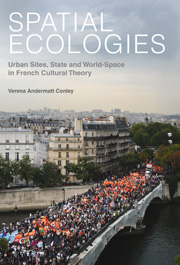Book contents
- Frontmatter
- Contents
- Introduction: Space as a Critical Concept
- 1 Henri Lefebvre: Lived Spaces
- 2 Michel de Certeau: Anthropological Spaces
- 3 Jean Baudrillard: Media Places
- 4 Marc Augé: Non-Places
- 5 Paul Virilio: Speed Space
- 6 Deleuze and Guattari: Space and Becoming
- 7 Bruno Latour: Common Spaces
- 8 Etienne Balibar: Spatial Fictions
- Conclusion: Future Spaces
- Bibliography
- Index
5 - Paul Virilio: Speed Space
- Frontmatter
- Contents
- Introduction: Space as a Critical Concept
- 1 Henri Lefebvre: Lived Spaces
- 2 Michel de Certeau: Anthropological Spaces
- 3 Jean Baudrillard: Media Places
- 4 Marc Augé: Non-Places
- 5 Paul Virilio: Speed Space
- 6 Deleuze and Guattari: Space and Becoming
- 7 Bruno Latour: Common Spaces
- 8 Etienne Balibar: Spatial Fictions
- Conclusion: Future Spaces
- Bibliography
- Index
Summary
After having lost the street in the nineteenth century, people are now also losing their voice.
Paul VirilioSpeed is not simply a matter of time. Speed is also space-time. It is an environment that is defined in equal measure by space and by time.
Armitage (ed.), Virilio LiveIn his recent homage to Marc Augé, Paul Virilio asserts that the author of Non-Places has turned anthropology into a science responsible less for reconstituting traditional cultures than for scaffolding an art of premonition. The ethnologist of today can no longer study societies “without history” but, rather, the fragile state of a world in which chronological time has telescoped to the state of instantaneity. Space, like the wild ass's skin in Balzac's La Peau de chagrin, has shrunk beyond belief. Virilio, whose brilliantly delphic writings hover between the messianic and the titanic, finds in Augé a friend who senses the effects that the acceleration of information have on subjectivity. The supermodernity (surmodernité) of which Augé writes “is surely the combined effect of the acceleration of history and of a shrinkage of geographical space giving occasion […] to both ‘an individualization of destinies’ and to diverse destinations of action” (Virilio 2008: 100). The effect, he notes, is that individuals now owe their existential being to a condition of solitude. They find themselves in a state of accelerated delocalization, which is exactly what the anthropologist discovered in his own premonitions.
- Type
- Chapter
- Information
- Spatial EcologiesUrban Sites, State and World-Space in French Cultural Theory, pp. 78 - 94Publisher: Liverpool University PressPrint publication year: 2012



